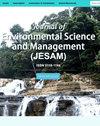影响坦桑尼亚Mbeya地区采用灌溉方法提高水稻产量的气候和社会经济因素
IF 0.3
4区 环境科学与生态学
Q4 ENVIRONMENTAL SCIENCES
引用次数: 0
摘要
由于气候变化和天气变化,农村农民面临着不同的挑战,这对作物生产和生产力构成了威胁。小规模农民试图通过适应不同的机制来应对当前的形势,包括采用灌溉服务。本研究旨在确定影响稻农采用灌溉技术的因素,并找出灌溉对坦桑尼亚姆贝亚地区水稻产量的重大贡献。数据是通过结构化问卷、访谈和焦点小组讨论收集的。数据分析采用描述性统计、逻辑回归和STATA(v13)的普通最小二乘(OLS)回归。描述性统计数据描述了家庭的社会人口和经济特征。Logistic回归结果证实,家庭的教育程度、劳动力规模、气象信息、获得金融服务、推广服务和以前的农业产出对农民采用灌溉方式有显著影响。OLS回归结果证实,灌溉对水稻产量的贡献率约为3.2%,且P>0.05。该研究建议坦桑尼亚采用灌溉技术,作为应对气候变化和天气变化负面影响的战略手段。本文章由计算机程序翻译,如有差异,请以英文原文为准。
Climate and Socio-economic Factors Affecting the Adoption of Irrigation Practices for Improved Rice Yield in Mbeya Region, Tanzania
Rural farmers are facing different challenges, resulting from climate change and weather variability, which pose threats in crop production and productivity. Small scale farmers try to cope with the prevailing situations by adjusting to different mechanisms including adopting irrigation services. This study seeks to determine the factors influencing rice farmers’ decision to adopt irrigation technology and find out the significant contribution of irrigation to rice yields in the Mbeya Region of Tanzania. Data were collected through structured questionnaires, interviews, and focus group discussions. Data analyses were performed by using descriptive statistics, logistic regression, and ordinary least square (OLS) regression by STATA (v13). The descriptive statistics characterized households’ socio-demographic and economic characteristics. Logistic regression results affirmed that households’ education, labor size, meteorological information, access to financial services, extension services and previous farm outputs significantly influenced irrigation adoption by farmers. Results from OLS regression confirmed that irrigation significantly contributed about 3.2 % to rice yield at P>0.05 level. The study recommends the adoption of irrigation technology in Tanzania as means of coping strategy to the negative impact of climate change and weather variations.
求助全文
通过发布文献求助,成功后即可免费获取论文全文。
去求助
来源期刊

Journal of Environmental Science and Management
ENVIRONMENTAL SCIENCES-
CiteScore
0.90
自引率
0.00%
发文量
10
审稿时长
2 months
期刊介绍:
The Journal of Environmental Science and Management (JESAM) is an international scientific journal produced semi-annually by the University of the Philippines Los Baños (UPLB).
JESAM gives particular premium to manuscript submissions that employ integrated methods resulting to analyses that provide new insights in environmental science, particularly in the areas of:
environmental planning and management;
protected areas development, planning, and management;
community-based resources management;
environmental chemistry and toxicology;
environmental restoration;
social theory and environment; and
environmental security and management.
 求助内容:
求助内容: 应助结果提醒方式:
应助结果提醒方式:


